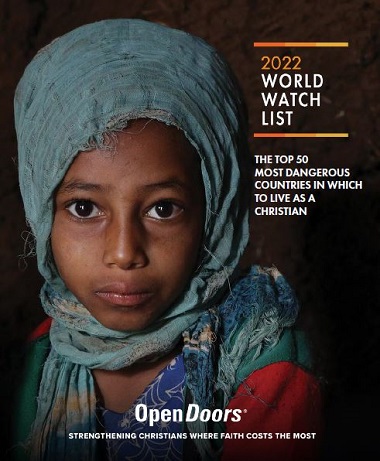 Early each year, Open Doors International offers us a glimpse into the lives of hundreds of millions of our Christian brothers and sisters around the world who are suffering for their faith.
Early each year, Open Doors International offers us a glimpse into the lives of hundreds of millions of our Christian brothers and sisters around the world who are suffering for their faith.
The World Watch List ranks the top 50 countries where it is most dangerous to live as a Christian, reminding us that both the church and our Western governments are paying too little attention to the issue.
One in seven
This year’s study reveals that more than 360 million Christians live in nations with high levels of persecution or discrimination – 1 in 7 Christians worldwide (1 in 5 in Africa, 2 in 5 in Asia and 1 in 15 in Latin America).
All 50 nations scored high enough to register ‘very high’ persecution levels on Open Doors’ 84-question matrix.
Where it’s hardest
These are the top 10 nations where it is hardest to follow Jesus:
1. Afghanistan
2. North Korea
3. Somalia
4. Libya
5. Yemen
6. Eritrea
7. Nigeria
8. Pakistan
9. Iran
10. India
Download a guide
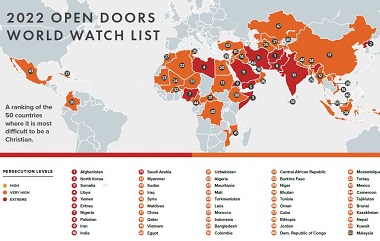 Gary Stagg, Executive Director of Open Doors Canada, sent out a link to the World Watch List January 23. He said:
Gary Stagg, Executive Director of Open Doors Canada, sent out a link to the World Watch List January 23. He said:
This year, Afghanistan surpassed North Korea to take the number one place, a position North Korea has held since 2002. It’s not that life has improved for North Korean Christians; in fact, it has become worse.
But with the takeover of the Afghan government by the Taliban and the increased pressure on Christians there, Afghanistan now holds the ominous title as the worst place on earth to live as a Christian. Incidentally, this development causes great concern as it has given jihadists worldwide a profound psychological boost.
Download your copy of this year’s World Watch List guide here.
The guide contains numbers and data representing a very important and large part of the Body of Christ. These are family members who suffer, and even put their lives on the line daily, just because they follow Jesus. They teach us so much about what real faith is, and we have the great privilege to stand with them in prayer and support.
From the guide
Here are a couple of examples from the top 50 nations:
- Afghanistan (#1)
Go here for the full 50-nation World Watch list.
Why are Christians persecuted?
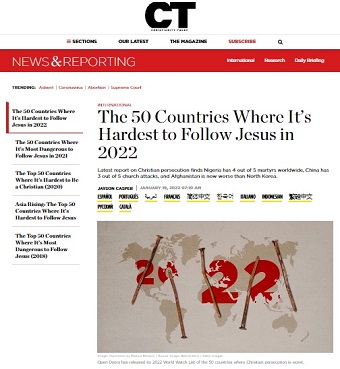 Christianity Today followed up on the 2022 World Watch List with a couple of very helpful articles. The first, by Jayson Casper, included this portion:
Christianity Today followed up on the 2022 World Watch List with a couple of very helpful articles. The first, by Jayson Casper, included this portion:
The main motivation varies by country, and better understanding the differences can help Christians in other nations pray and advocate more effectively for their beleaguered brothers and sisters in Christ.
Open Doors categorizes the primary sources of Christian persecution into eight groups:
Islamic oppression (33 countries): This is the main source of persecution that Christians face in more than half of the watch list countries, including 7 of the top 10 overall: Afghanistan (No. 1), Somalia (No. 3), Libya (No. 4), Yemen (No. 5), Nigeria (No. 7), Pakistan (No. 8) and Iran (No. 9). Most of the 33 are officially Muslim nations or have Muslim majorities; however, 6 actually have Christian majorities: Nigeria, Central African Republic (No. 31), Ethiopia (No. 38), Democratic Republic of Congo (No. 40), Mozambique (No. 41) and Cameroon (No. 44).
Dictatorial paranoia (5 countries): This is the main source of persecution that Christians face in five countries, mostly in Central Asia, with Muslim majorities: Uzbekistan (No. 21), Turkmenistan (No. 25), Bangladesh (No. 29), Tajikistan (No. 45) and Kazakhstan (No. 47).
Communist and post-communist oppression (5 countries): This is the main source of persecution that Christians face in five countries, primarily in Asia: North Korea (No. 2), China (No. 17), Vietnam (No. 19), Laos (No. 26) and Cuba (No. 37).
Religious nationalism (4 countries): This is the main source of persecution that Christians face in four Asian nations. Christians are primarily targeted by Hindu nationalists in India (No. 10) and Nepal (No. 48), and by Buddhist nationalists in Myanmar (No. 12) and Bhutan (No. 34).
Organized crime and corruption (2 countries): This is the main source of persecution that Christians face in Colombia (No. 30) and Mexico (No. 43).
Christian denominational protectionism (1 country): This is the main source of persecution that Christians face in Eritrea (No. 6).
Secular intolerance (0 countries) and clan oppression (0 countries): Open Doors tracks these sources of persecution, but neither is the main source in any of the 50 countries on the 2022 list. However, last year clan oppression was the primary driver in Afghanistan, Somalia, Laos, Qatar, Nepal and Oman.
Go here for the full article.
Credit where credit is due
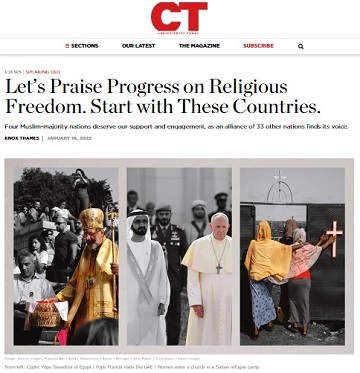 The other Christianity Today article, by Knox Thames, offered some words of encouragement:
The other Christianity Today article, by Knox Thames, offered some words of encouragement:
Yet while the World Watch List paints a troubling picture, the news is not all bad. There are positive situations in a few countries.
Of course they are not perfect, and Open Doors still gives several low marks. But these glimmers of light are worthy of prayer, support and continued engagement to press for further improvements.
Here are my picks for five recent religious freedom developments worth praising:
-
- United Arab Emirates
- Sudan
- Uzbekistan
- Egypt
- IRFBA (alliance)
Go here for an explanation of why he chose these four nations, and why he included IRFBA (International Religious Freedom or Belief Alliance) – which describes its work in this way:
-
- The Alliance is a network of like-minded countries fully committed to advancing freedom of religion or belief around the world. Alliance members must fully commit to the Declaration of Principles.
- The Declaration is grounded in Article 18 of the Universal Declaration for Human Rights, which states everyone has freedom to believe or not believe, to change faith, to meet alone for prayer or corporately for worship.
- Currently 33 countries have joined the Alliance: Albania, Armenia, Austria, Australia, Bosnia and Herzegovina, Brazil, Bulgaria, Cameroon, Colombia, Croatia, Czech Republic, The Democratic Republic of Congo, Denmark, Estonia, The Gambia, Georgia, Greece, Hungary, Israel, Kosovo, Latvia, Lithuania, Malta, the Netherlands, Norway, Poland, Senegal, Slovakia, Slovenia, Togo, Ukraine, the United Kingdom and the United States.
Go here for the full article. (Note that Canada is not on the list.)

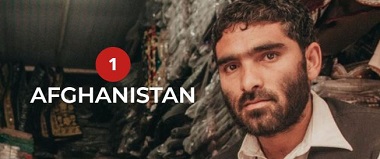 It is impossible to live openly as a Christian in Afghanistan. Leaving Islam is considered shameful, and Christian converts face dire consequences if their new faith is discovered. Either they have to flee the country or they will be killed.
It is impossible to live openly as a Christian in Afghanistan. Leaving Islam is considered shameful, and Christian converts face dire consequences if their new faith is discovered. Either they have to flee the country or they will be killed. 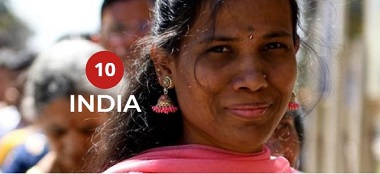 The persecution of Christians in India is intensifying as Hindu extremists aim to cleanse the country of their presence and influence.
The persecution of Christians in India is intensifying as Hindu extremists aim to cleanse the country of their presence and influence. Burkina Faso is located in a region where Islamist groups have a huge and growing influence. The central government is very weak, particularly in the east of the country where Islamic law is informally implemented by groups who’ve gained control over these areas.
Burkina Faso is located in a region where Islamist groups have a huge and growing influence. The central government is very weak, particularly in the east of the country where Islamic law is informally implemented by groups who’ve gained control over these areas.